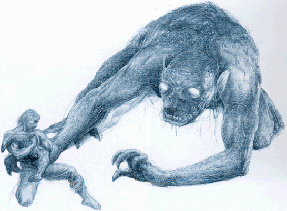Heroism is both a value of Anglo-Saxons and a theme of Beowulf. It includes bravery, loyalty, and generosity, all of which Beowulf personifies. “Beowulf, a prince of the Geats, had killed Grendel, ended the grief, the sorrow, the suffering forced on Hrothgar’s helpless people by a bloodthirsty fiend” (l 510-514). By defeating Grendel, Beowulf earned the right to be glorified by the Geats. Also, while defeating the dragon, Grendel, and Grendel’s mother, he displays his heroic nature and desire to leave his legacy behind after his death.
In Anglo-Saxon society, comitatus is a highly regarded characteristic in thanes. It is the life-giving allegiance to a king while expecting his compassion and generosity in return. “‘When we crossed the sea, my comrades and I, I already knew that all my purpose was this: to win the good will of your people or die in battle, pressed in Grendel’s fierce grip. Let me live in greatness and courage, or here in this hall welcome my death’” (l 364-369)! Even with the doubt that he may not survive his battle with Grendel, the beast haunting Herot, Beowulf and his men bravely trek to Hrothgar’s kingdom to exterminate the monster.
A recurring theme in Beowulf is the fight between good and evil. Beowulf, the hero and savior of Hrothgar and his people, travels to Herot to battle Grendel, the evil monster spawned from Cain, the first murderer on earth. They both struggle to defeat one another, good versus evil, both powerful and fighting for his life. “That shepherd of evil, guardian of crime, knew at once that nowhere on earth had he met a man whose hands were harder; his mind was flooded with fear – but nothing could take his talons and himself from that tight hard grip. Grendel’s one thought was to run from Beowulf, flee back to his marsh and hide there: this was a different Herot than the hall he had emptied” (l 432-437). Throughout the poem, Grendel wreaks havoc in Hrothgar’s kingdom, instilling hatred of him in others. Beowulf, however, arrives from a distant kingdom to save Hrothgar and gain fame as well as a legacy as a hero.


No comments:
Post a Comment